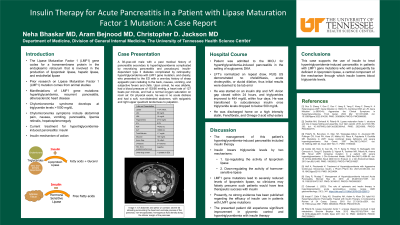Tuesday Poster Session
Category: Biliary/Pancreas
P3598 - Insulin Therapy for Acute Pancreatitis in a Patient With Lipase Maturation Factor 1 Mutation: A Case Report
Tuesday, October 29, 2024
10:30 AM - 4:00 PM ET
Location: Exhibit Hall E

Has Audio

Neha Bhaskar, MD
University of Tennessee Health Science Center
Memphis, TN
Presenting Author(s)
Neha Bhaskar, MD, Aram Bejnood, MD, Christopher D.. Jackson, MD
University of Tennessee Health Science Center, Memphis, TN
Introduction: The lipase maturation factor 1 (LMF1) gene codes for a transmembrane protein in the endoplasmic reticulum that is involved with the production of lipoprotein lipase, hepatic lipase, and endothelial lipase.[1] Thus, a mutation in LMF1 leads to a deficiency in lipase, which in turn leads to severe hypertriglyceridemia. Hypertriglyceridemia-induced pancreatitis is managed with insulin which increases the activity of lipoprotein lipase. No strong evidence has yet been published regarding the efficacy of insulin use in patients with LMF1 mutations, in whom lipoprotein lipase levels are reduced, and thus clinicians may falsely presume such patients would have less therapeutic success with insulin therapy.
Case Description/Methods: The patient is a 38-year-old male with hypertriglyceridemia-induced pancreatitis complicated by necrotizing pancreatitis and pseudocyst, insulin-dependent type II diabetes, and LMF1 gene mutation who presented to the ED with a one-day history of sharp epigastric pain radiating to the back, nausea, vomiting, and subjective fevers and chills. Upon arrival, he was afebrile and tachycardic. He had a soft, non-distended abdomen, with epigastric tenderness to palpation. Labs showed lipase 1134 units/L, LDL 66 mg/dL, HDL 10 mg/dL, triglycerides 2773 mg/dL, A1c 6.8%, anion gap 19 mEq/L, glucose 155 mg/dL, urinalysis with 3+ ketones. CT abdomen findings were consistent with acute pancreatitis with peripancreatic fluid collection. RUQ US was normal. He was treated with IV fluids and an insulin drip. His triglycerides improved to 464mg/dL within four days, at which point he was transitioned to subcutaneous insulin. He was discharged home with the resolution of pain and resumption of oral intake.
Discussion: This case supports the use of insulin to treat hypertriglyceridemia-induced pancreatitis in patients with LMF1 mutations (who will be subsequently deficient in lipoprotein lipase, a central component of the mechanism through which insulin lowers blood triglyceride levels). Prior research into the implications of LMF1 mutations comes from animal studies. Thus, further investigation may be needed to understand how insulin is effective in patients with LMF1 mutations presenting with hypertriglyceridemia-induced pancreatitis.
[1] Doolittle MH, et al. Lipase maturation factor 1: structure and role in lipase folding and assembly, 2010 Jun, 198-203
Disclosures:
Neha Bhaskar, MD, Aram Bejnood, MD, Christopher D.. Jackson, MD. P3598 - Insulin Therapy for Acute Pancreatitis in a Patient With Lipase Maturation Factor 1 Mutation: A Case Report, ACG 2024 Annual Scientific Meeting Abstracts. Philadelphia, PA: American College of Gastroenterology.
University of Tennessee Health Science Center, Memphis, TN
Introduction: The lipase maturation factor 1 (LMF1) gene codes for a transmembrane protein in the endoplasmic reticulum that is involved with the production of lipoprotein lipase, hepatic lipase, and endothelial lipase.[1] Thus, a mutation in LMF1 leads to a deficiency in lipase, which in turn leads to severe hypertriglyceridemia. Hypertriglyceridemia-induced pancreatitis is managed with insulin which increases the activity of lipoprotein lipase. No strong evidence has yet been published regarding the efficacy of insulin use in patients with LMF1 mutations, in whom lipoprotein lipase levels are reduced, and thus clinicians may falsely presume such patients would have less therapeutic success with insulin therapy.
Case Description/Methods: The patient is a 38-year-old male with hypertriglyceridemia-induced pancreatitis complicated by necrotizing pancreatitis and pseudocyst, insulin-dependent type II diabetes, and LMF1 gene mutation who presented to the ED with a one-day history of sharp epigastric pain radiating to the back, nausea, vomiting, and subjective fevers and chills. Upon arrival, he was afebrile and tachycardic. He had a soft, non-distended abdomen, with epigastric tenderness to palpation. Labs showed lipase 1134 units/L, LDL 66 mg/dL, HDL 10 mg/dL, triglycerides 2773 mg/dL, A1c 6.8%, anion gap 19 mEq/L, glucose 155 mg/dL, urinalysis with 3+ ketones. CT abdomen findings were consistent with acute pancreatitis with peripancreatic fluid collection. RUQ US was normal. He was treated with IV fluids and an insulin drip. His triglycerides improved to 464mg/dL within four days, at which point he was transitioned to subcutaneous insulin. He was discharged home with the resolution of pain and resumption of oral intake.
Discussion: This case supports the use of insulin to treat hypertriglyceridemia-induced pancreatitis in patients with LMF1 mutations (who will be subsequently deficient in lipoprotein lipase, a central component of the mechanism through which insulin lowers blood triglyceride levels). Prior research into the implications of LMF1 mutations comes from animal studies. Thus, further investigation may be needed to understand how insulin is effective in patients with LMF1 mutations presenting with hypertriglyceridemia-induced pancreatitis.
[1] Doolittle MH, et al. Lipase maturation factor 1: structure and role in lipase folding and assembly, 2010 Jun, 198-203
Disclosures:
Neha Bhaskar indicated no relevant financial relationships.
Aram Bejnood indicated no relevant financial relationships.
Christopher Jackson indicated no relevant financial relationships.
Neha Bhaskar, MD, Aram Bejnood, MD, Christopher D.. Jackson, MD. P3598 - Insulin Therapy for Acute Pancreatitis in a Patient With Lipase Maturation Factor 1 Mutation: A Case Report, ACG 2024 Annual Scientific Meeting Abstracts. Philadelphia, PA: American College of Gastroenterology.
